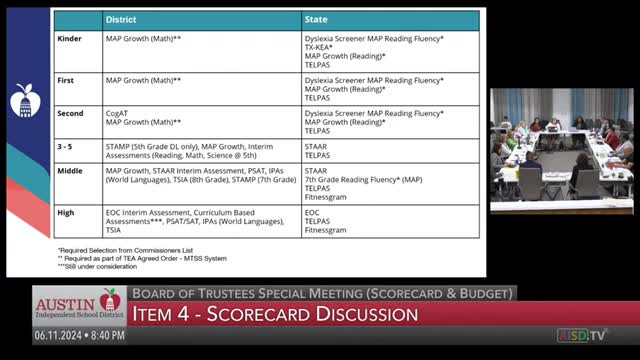Educators push for joy in learning over test scores
June 22, 2024 | AUSTIN ISD, School Districts, Texas

This article was created by AI summarizing key points discussed. AI makes mistakes, so for full details and context, please refer to the video of the full meeting. Please report any errors so we can fix them. Report an error »

During a recent government meeting, significant discussions centered around the educational scorecard and its implications for student learning. Participants expressed concerns that the current scorecard framework may inadvertently narrow educational experiences, particularly for students who require additional support. One speaker emphasized the importance of project-based learning, arguing that hands-on projects are essential for genuine learning rather than mere enrichment activities.
The conversation highlighted a shared anxiety about how high-stakes testing and data-driven metrics could overshadow the broader educational values that the community holds dear. Many attendees voiced a desire for their children to experience joy in learning, rather than focusing solely on test scores. They stressed that while academic proficiency is crucial, fostering a love for learning and helping students discover their passions should be prioritized.
As the meeting progressed, the discussion shifted towards the specifics of the scorecard presentation. The superintendent outlined the goals for third-grade literacy and numeracy, emphasizing that the scorecard would report on all student groups, ensuring that no demographic is overlooked. The goals aim to increase the percentage of students reading at grade level and to track kindergarten students' progress on specific tasks.
Overall, the meeting underscored a collective commitment to balancing accountability with a holistic approach to education, ensuring that the system supports both academic achievement and the intrinsic joy of learning.
The conversation highlighted a shared anxiety about how high-stakes testing and data-driven metrics could overshadow the broader educational values that the community holds dear. Many attendees voiced a desire for their children to experience joy in learning, rather than focusing solely on test scores. They stressed that while academic proficiency is crucial, fostering a love for learning and helping students discover their passions should be prioritized.
As the meeting progressed, the discussion shifted towards the specifics of the scorecard presentation. The superintendent outlined the goals for third-grade literacy and numeracy, emphasizing that the scorecard would report on all student groups, ensuring that no demographic is overlooked. The goals aim to increase the percentage of students reading at grade level and to track kindergarten students' progress on specific tasks.
Overall, the meeting underscored a collective commitment to balancing accountability with a holistic approach to education, ensuring that the system supports both academic achievement and the intrinsic joy of learning.
View full meeting
This article is based on a recent meeting—watch the full video and explore the complete transcript for deeper insights into the discussion.
View full meeting
